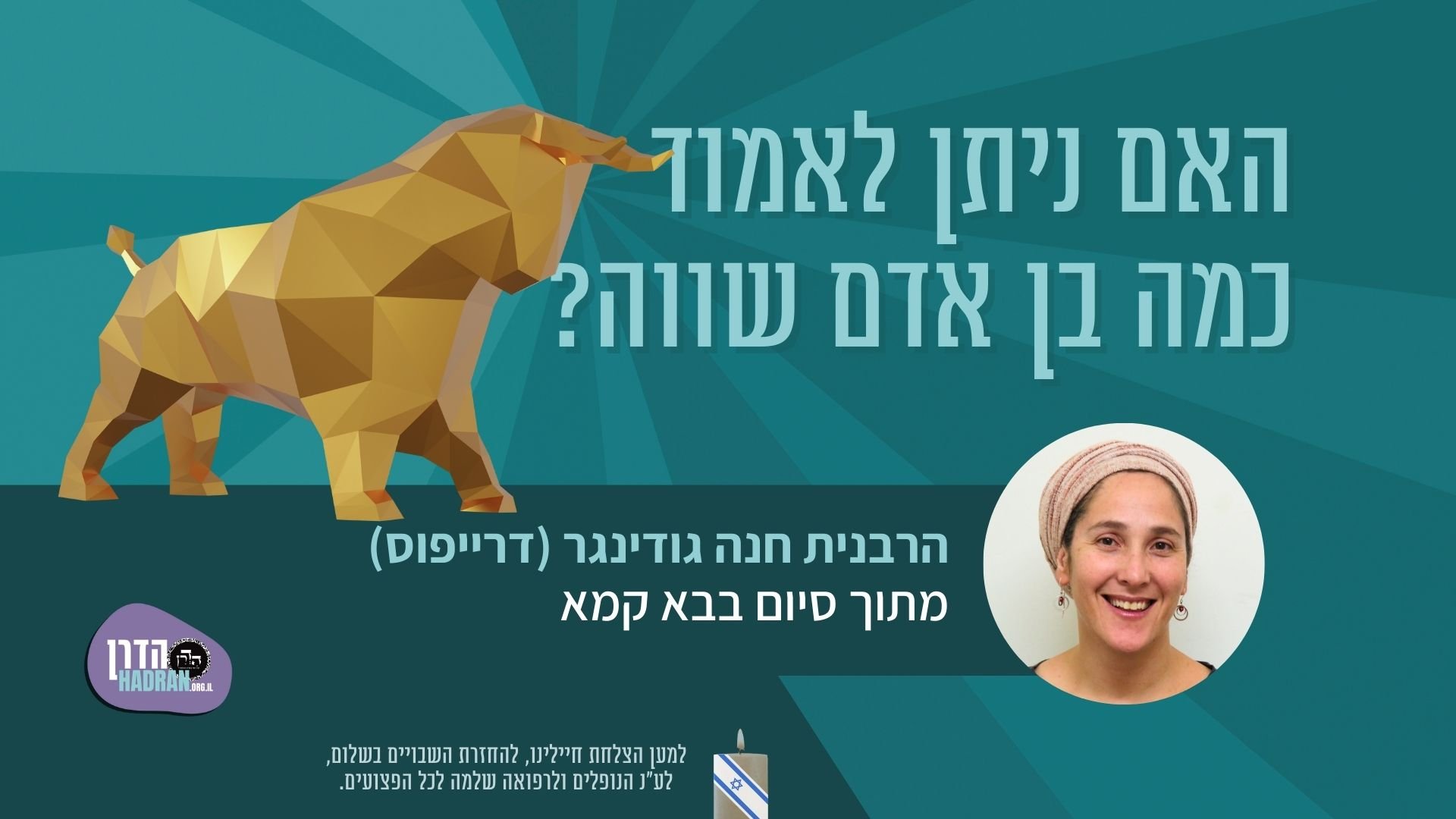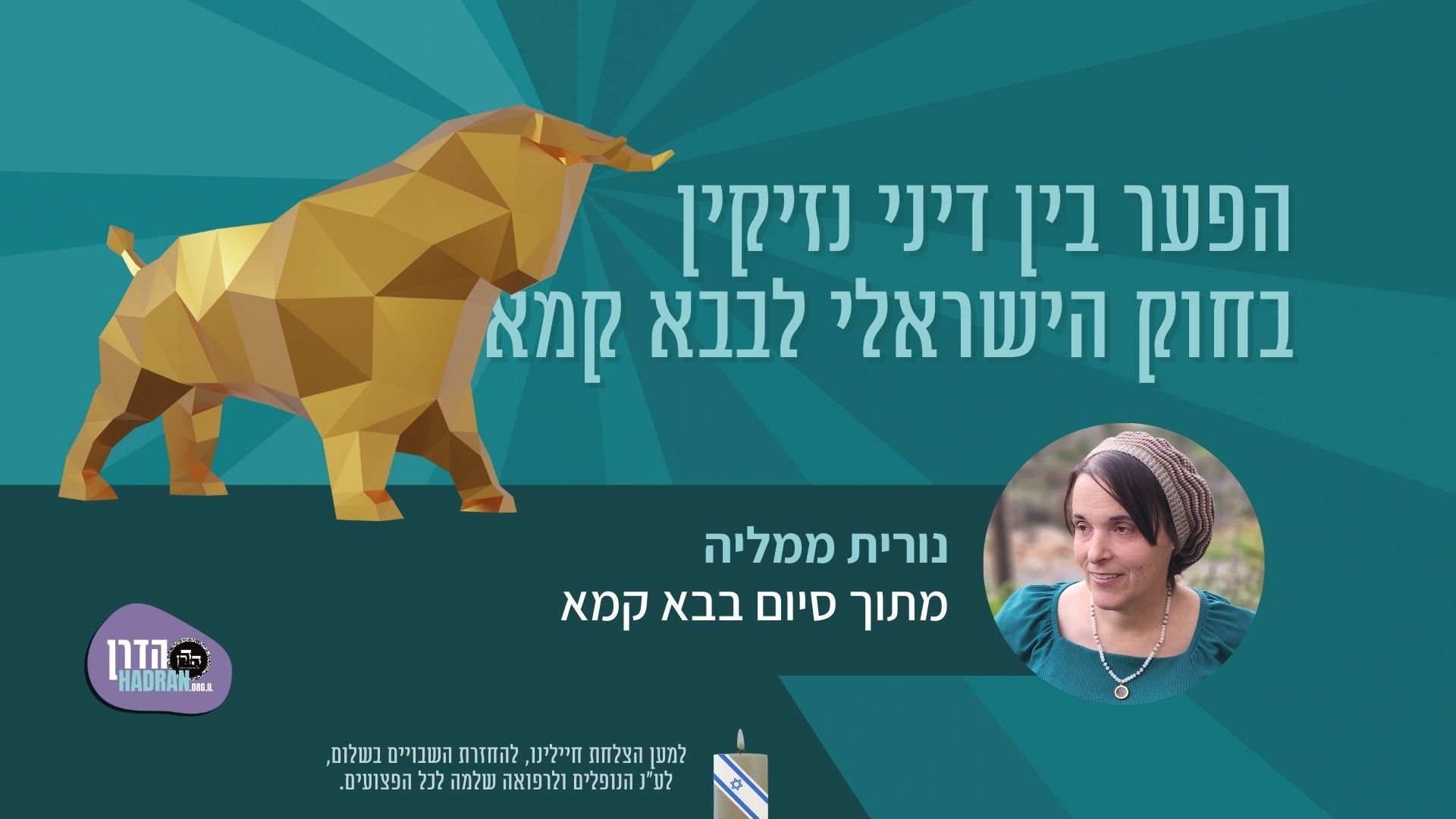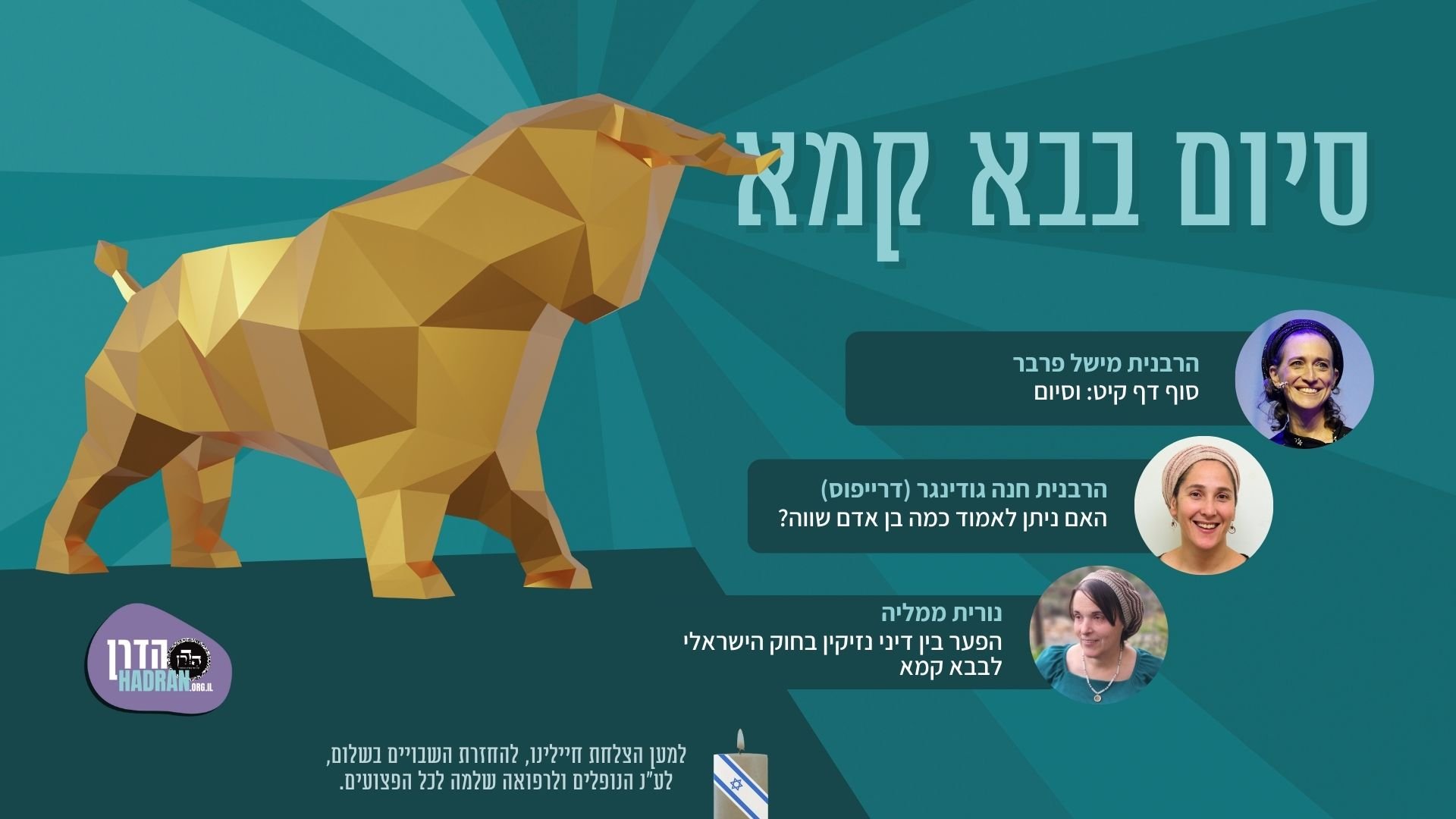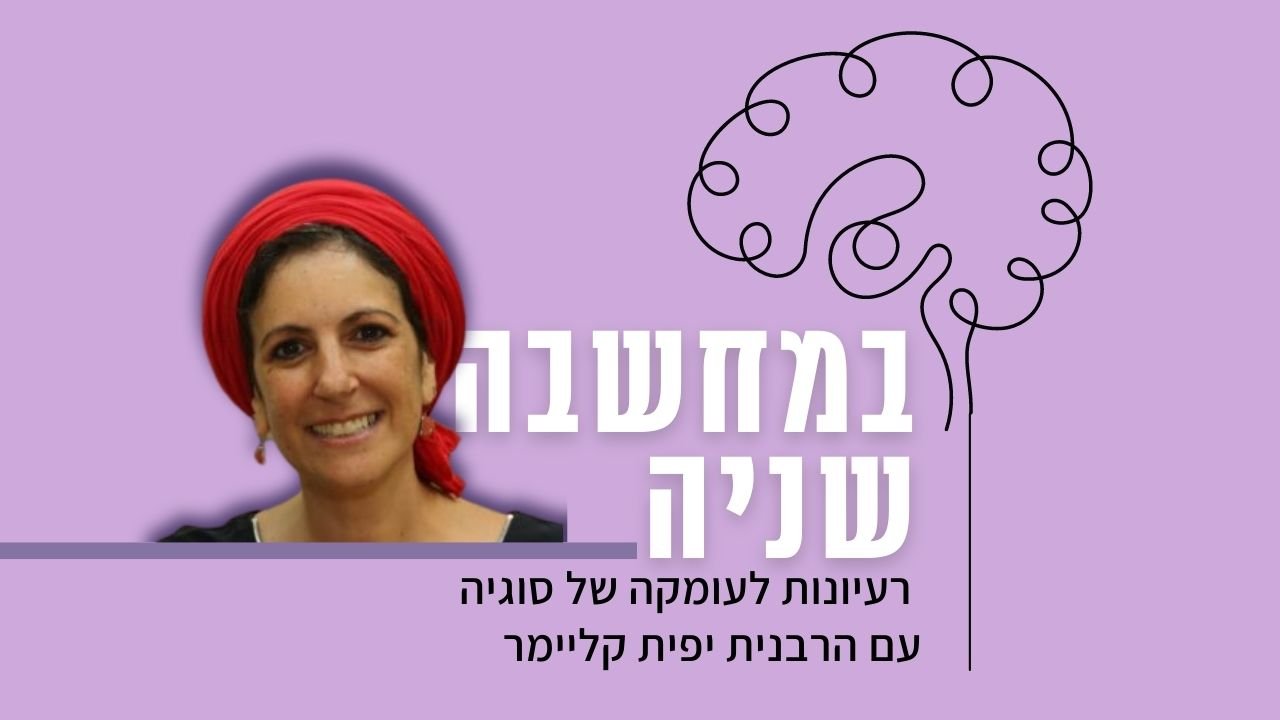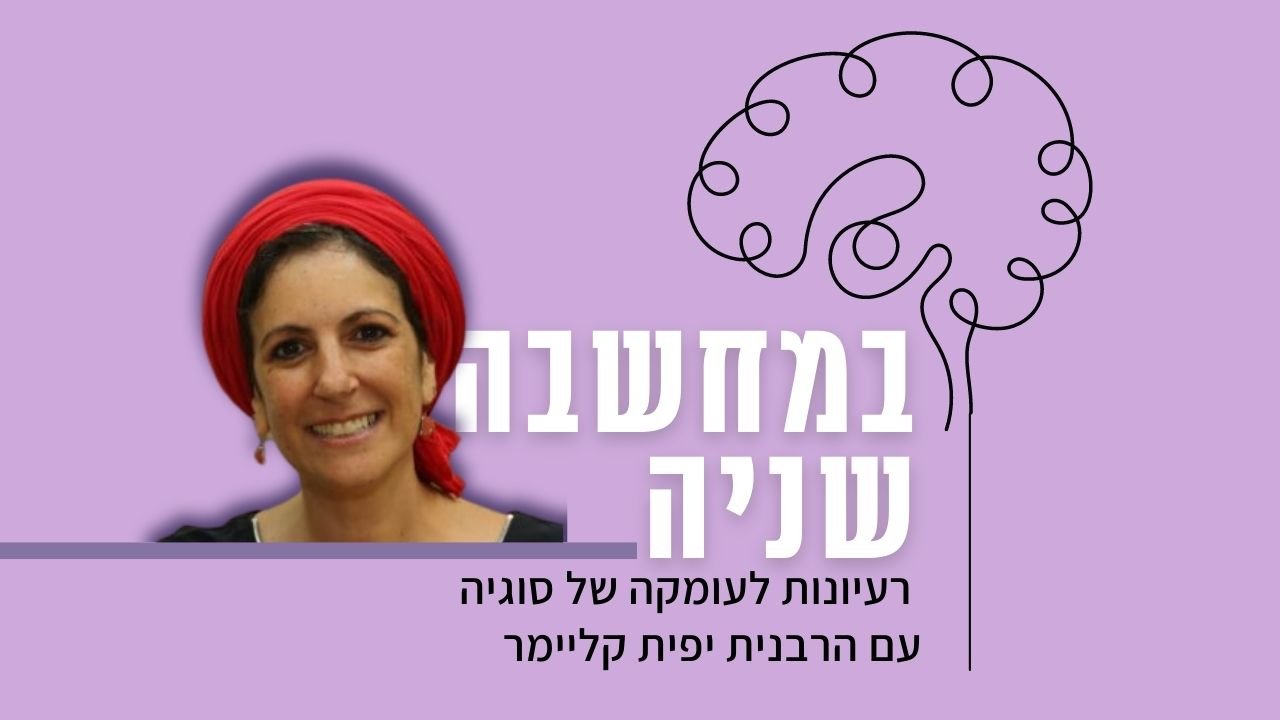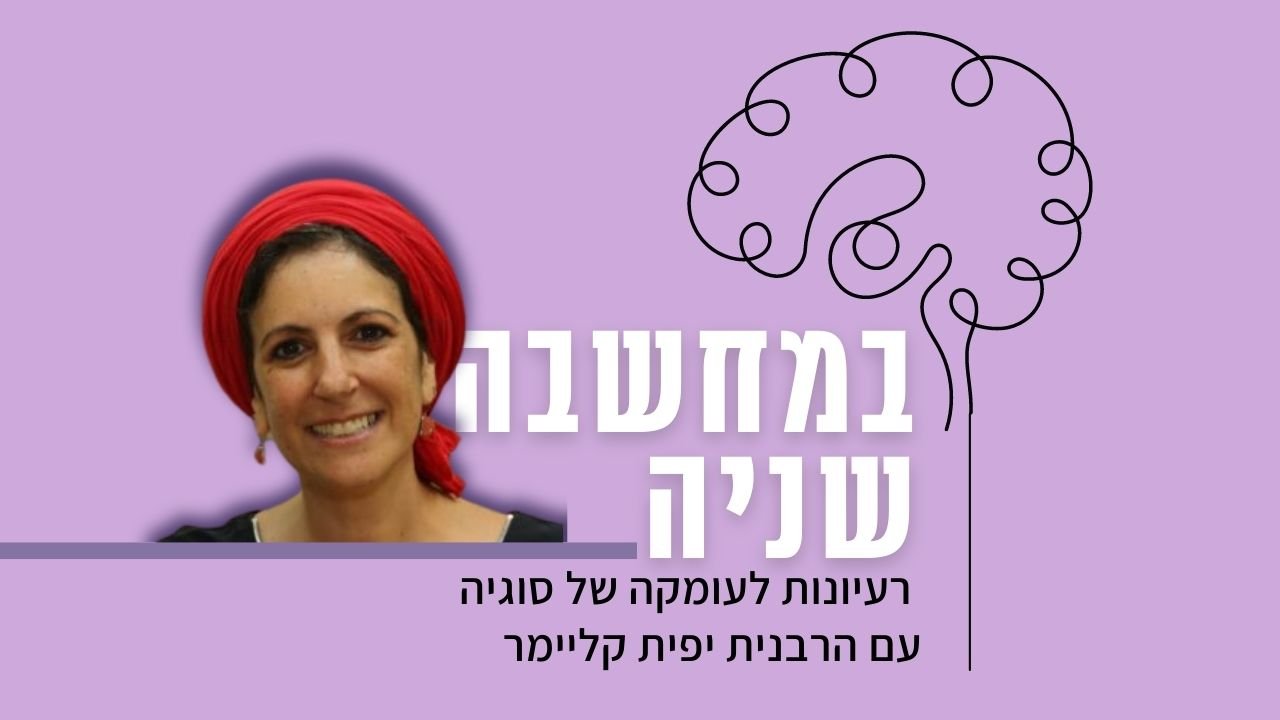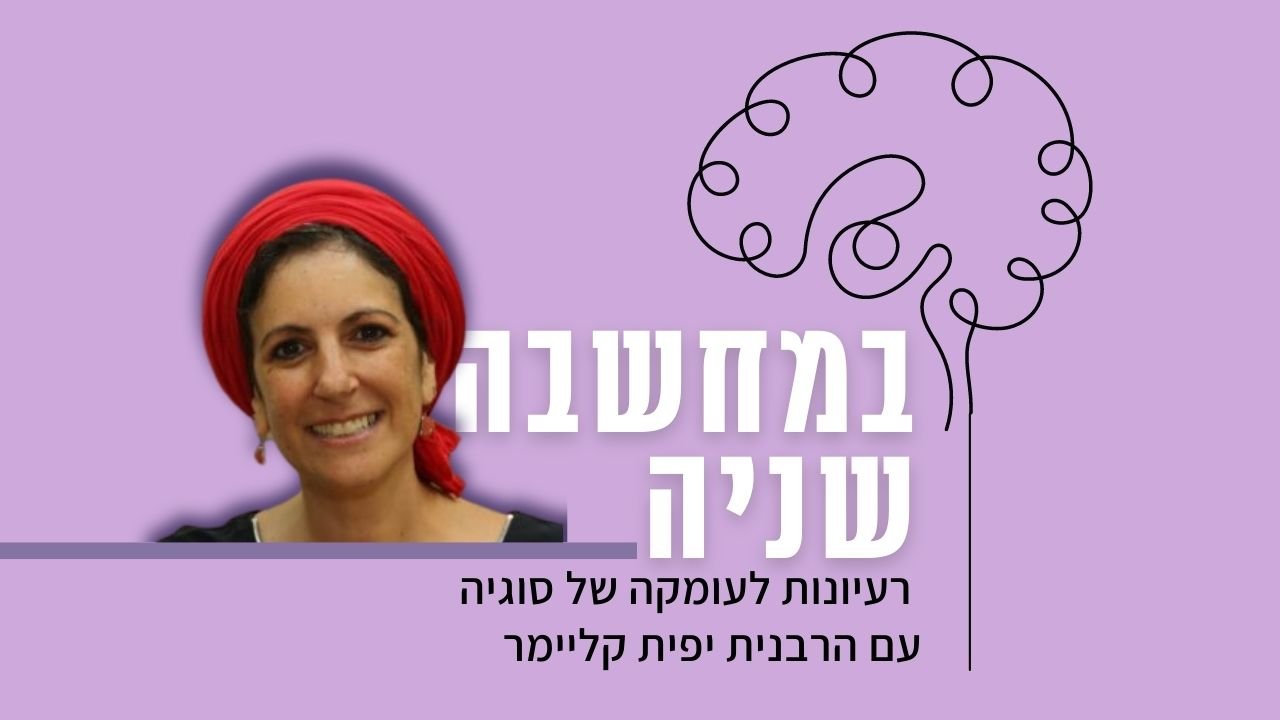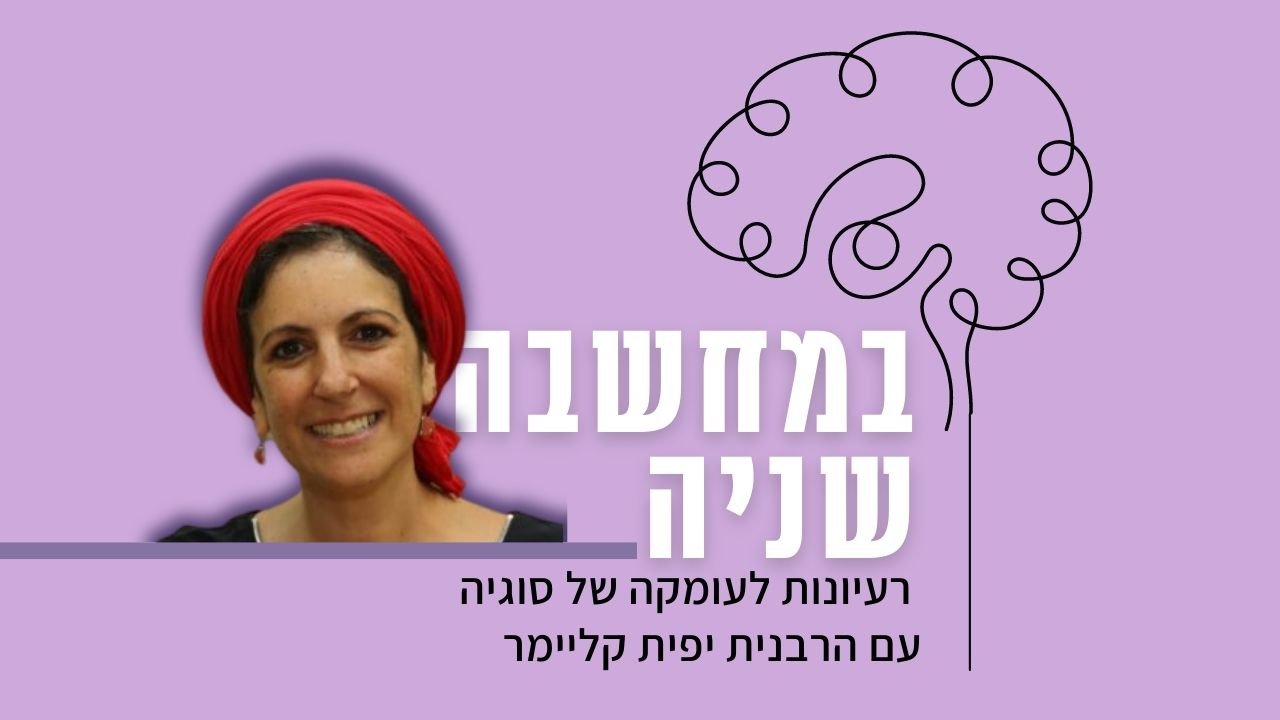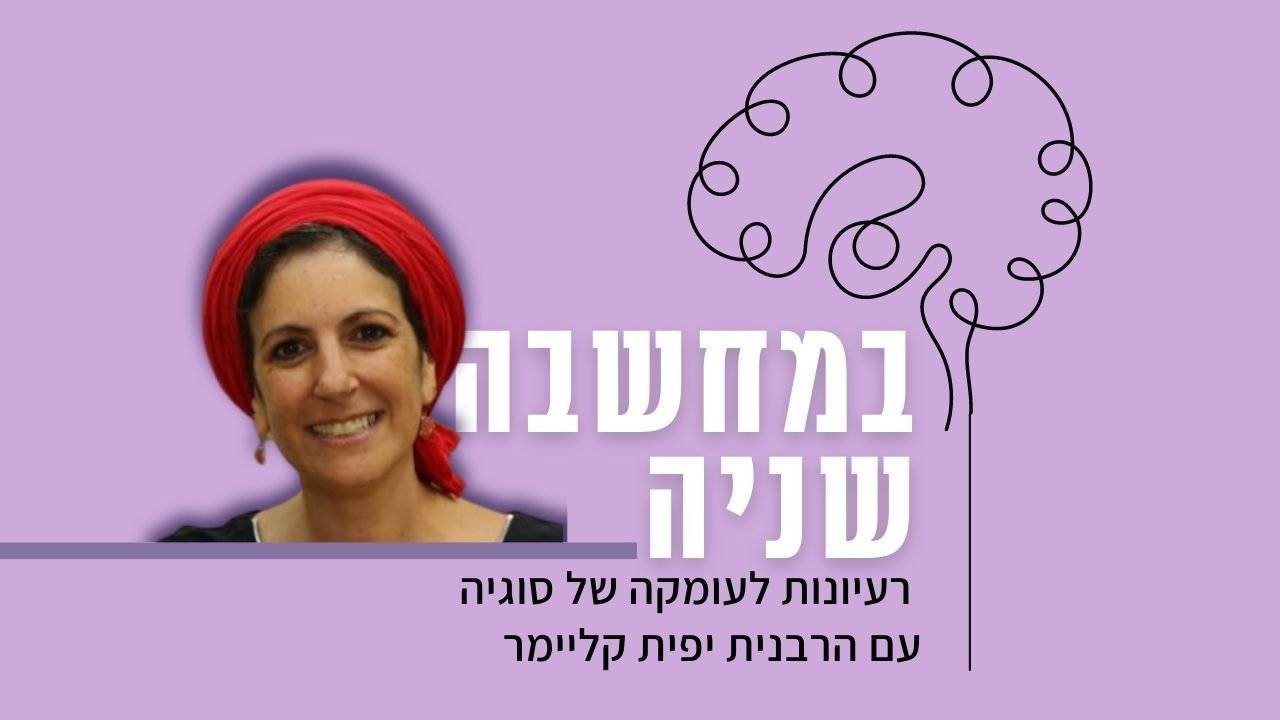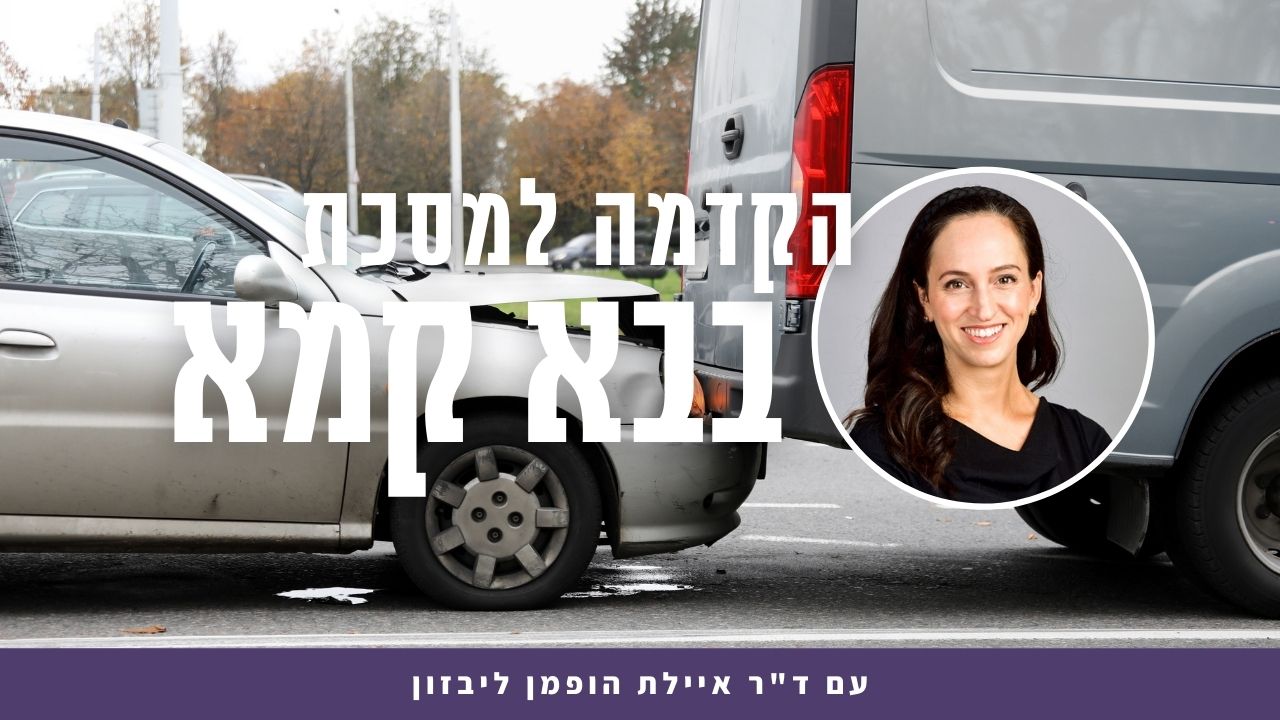בבא קמא יא
יָבִיא עֵדִים שֶׁנִּטְרְפָה בְּאוֹנֶס, וּפָטוּר. אַבָּא שָׁאוּל אוֹמֵר: יָבִיא עֲדוּדָה לְבֵית דִּין.
This means that the bailee should bring witnesses that the animal was mauled through circumstances beyond his control, and based on their testimony he is exempt from liability. Abba Shaul says: The word ed should not be interpreted as witness, but as carcass. Accordingly, the bailee should immediately bring the carcass [aduda] to court in order to appraise its current value.
מַאי, לָאו בְּהָא קָמִיפַּלְגִי – דְּמָר סָבַר: פְּחַת נְבֵילָה דְּנִיזָּק הָוֵי, וּמָר סָבַר: דְּמַזִּיק הָוֵי?
What, is it not so that they disagree about this matter: That one Sage, Abba Shaul, holds that the loss due to the diminishing value of the carcass is sustained by the injured party, and so there is a need to appraise its value immediately in order to correctly assess how much the one liable for the damage must pay, and the other Sage, the first tanna, holds that the loss due to the diminishing value of the carcass is sustained by the one liable for the damage because the Torah granted him ownership of it.
לָא, דְּכוּלֵּי עָלְמָא דְּנִיזָּק, וְהָכָא בְּטוֹרַח נְבֵילָה קָמִיפַּלְגִי;
The Gemara rejects this: No, everyone agrees that the loss due to the diminishing value of the carcass is sustained by the injured party, since he owns it, and here they disagree concerning who must go to the effort of retrieving the carcass and transporting it to the court to be appraised.
וְהָתַנְיָא, אֲחֵרִים אוֹמְרִים: מִנַּיִין שֶׁעַל בַּעַל הַבּוֹר לְהַעֲלוֹת שׁוֹר מִבּוֹרוֹ – תַּלְמוּד לוֹמַר: ״כֶּסֶף יָשִׁיב לִבְעָלָיו, וְהַמֵּת״.
And so it is taught in a baraita: Others say: From where is it derived that it is incumbent upon the owner of the pit to raise the ox from his pit after it was killed by falling into it? The verse states: “The owner of the pit shall pay; he shall restore money to its owner, and the carcass shall be his” (Exodus 21:34). They read the term “and the carcass” as a second subject of the term “he shall restore.” It therefore indicates that the one liable for the damage must restore the carcass to the injured party by retrieving it. The fact that this opinion is introduced with the phrase: Others say, suggests that it stands in opposition to another opinion. That other opinion apparently holds that the owner of the injured animal is responsible for retrieving the carcass.
אֲמַר לֵיהּ אַבָּיֵי לְרָבָא: הַאי טוֹרַח נְבֵילָה, הֵיכִי דָּמֵי?
Abaye said to Rava: What are the circumstances in which the one liable for the damage is required to go to this effort, to retrieve the carcass from the pit?
אִילֵימָא דִּבְבֵירָא שָׁוְיָא זוּזָא, וְאַגּוּדָּא שָׁוְיָא אַרְבַּע; כִּי טָרַח – בִּדְנַפְשֵׁיהּ טָרַח!
If we say that while still inside the pit, the carcass is worth a dinar, and when it is at the edge of the pit, since it is more accessible, its market value increases and is worth four dinars, then when the one liable for the damage expends the effort to retrieve the carcass, he is expending the effort for his own sake, since by increasing the value of the carcass he reduces his own liability. Therefore, he will certainly retrieve it of his own accord, and it is not necessary for the Torah to require him to do so.
אֲמַר לֵיהּ: לָא צְרִיכָא, דִּבְבֵירָא שָׁוְיָא זוּזָא, וְאַגּוּדָּא נָמֵי שָׁוְיָא זוּזָא.
Rava said to him: No, it is necessary to require him to retrieve the carcass in a case where, while still inside the pit the carcass is worth one dinar, and when it is at the edge of the pit, despite being more accessible, it is still worth one dinar. Since it is of no benefit to him to retrieve it, the Torah had to require him to do so.
וּמִי אִיכָּא כְּהַאי גַוְונָא? אִין, דְּהָא אָמְרִי אִינָשֵׁי: כְּשׁוּרָא בְּמָתָא בְּזוּזָא, כְּשׁוּרָא בְּדַבְרָא בְּזוּזָא.
The Gemara asks: But is there ever a case like this, where despite being more accessible its market value does not change? The Gemara answers: Yes, as people say, a beam of wood in the city sells for a dinar, and a beam of wood in the field also sells for a dinar, despite the fact that it needs to be transported from there to the city.
אָמַר שְׁמוּאֵל: אֵין שָׁמִין לֹא לְגַנָּב וְלֹא לְגַזְלָן, אֶלָּא לְנִזָּקִין. וַאֲנִי אוֹמֵר: אַף לְשׁוֹאֵל. וְאַבָּא מוֹדֶה לִי.
§ Shmuel says: The practice of the court is that when an animal or other item is stolen and then is damaged or dies, the court does not appraise its current value and assign ownership of it to its owner, in order that the perpetrator should have to pay only the difference between its prior value and its current value, neither for the sake of a thief nor for the sake of a robber. Rather, the thief or robber acquires ownership of the carcass or damaged item and compensates the owner for its prior value. The court appraises the item or carcass only for damages, as the Gemara explained above. And I say that they appraise the item or animal even for a borrower who borrowed an item and while it was in his possession it became damaged, or who borrowed an animal and while it was in his possession it died, and Abba, i.e., Rav, concedes to me.
אִיבַּעְיָא לְהוּ: הָכִי קָאָמַר – אַף לְשׁוֹאֵל שָׁמִין, וְאַבָּא מוֹדֶה לִי; אוֹ דִלְמָא, הָכִי קָאָמַר – וַאֲנִי אוֹמֵר: אַף לְשׁוֹאֵל אֵין שָׁמִין, וְאַבָּא מוֹדֶה לִי?
A dilemma was raised before them: Is this what Shmuel is saying: The court appraises the value of an item or a carcass even for the sake of a borrower, and Abba concedes to me; or perhaps, this is what Shmuel is saying: And I say that the court does not appraise its value even for a borrower, and Abba concedes to me?
תָּא שְׁמַע, דְּהָהוּא גַּבְרָא דִּשְׁאֵיל נַרְגָּא מֵחַבְרֵיהּ, תַּבְרֵהּ. אֲתָא לְקַמֵּיהּ דְּרַב, אֲמַר לֵיהּ: זִיל שַׁלֵּים לֵיהּ נַרְגָּא מְעַלְּיָא. שְׁמַע מִינַּהּ אֵין שָׁמִין!
Come and hear a resolution from the following incident: There was a certain man who borrowed an ax from another and he broke it. He came before Rav to rule if, and how much, he was liable to pay for it. Rav said to him: Go and pay him with a full-fledged ax, i.e., you must compensate the owner for the full value of the ax that you broke. The Gemara suggests: Conclude from it that the court does not appraise its value for the sake of a borrower.
אַדְּרַבָּה, מִדְּאָמְרִי לֵיהּ רַב כָּהֲנָא וְרַב אַסִּי לְרַב: ״דִּינָא הָכִי?!״ וּשְׁתֵיק, שְׁמַע מִינַּהּ שָׁמִין.
The Gemara rejects this: On the contrary, from the fact that Rav Kahana and Rav Asi said to Rav on that occasion: Is this the halakha? And Rav remained silent, this suggests that he conceded to their opinion that the borrower should not have had to pay the full value of the ax. Accordingly, conclude from it that the court appraises an item’s value for the sake of a borrower.
אִיתְּמַר, אָמַר עוּלָּא אָמַר רַבִּי אֶלְעָזָר: שָׁמִין לְגַנָּב וּלְגַזְלָן. רַב פַּפֵּי אָמַר: אֵין שָׁמִין. וְהִלְכְתָא: אֵין שָׁמִין לֹא לְגַנָּב וְלֹא לְגַזְלָן, אֲבָל לְשׁוֹאֵל שָׁמִין – כִּדְרַב כָּהֲנָא וְרַב אַסִּי.
An amoraic dispute was stated: Ulla says that Rabbi Elazar says: The court appraises a stolen item’s value for a thief and for a robber. Rav Pappi says: It does not appraise its value for them. The Gemara concludes: And the halakha is that the court does not appraise value either for a thief or for a robber; but it appraises value for a borrower, in accordance with the opinion of Rav Kahana and Rav Asi.
וְאָמַר עוּלָּא אָמַר רַבִּי אֶלְעָזָר: שִׁלְיָא שֶׁיָּצְתָה מִקְצָתָהּ בְּיוֹם רִאשׁוֹן וּמִקְצָתָהּ בְּיוֹם שֵׁנִי, מוֹנִין לָהּ מִן הָרִאשׁוֹן.
§ The Gemara cites additional halakhot taught by Ulla, citing Rabbi Elazar: When a woman gives birth or miscarries a fetus she is thereby rendered ritually impure (see Leviticus 12:1–5). Even if she delivers only the afterbirth, with no discernible fetus, she is rendered ritually impure due to the possibility that the fetus was dissolved in the afterbirth, and it is therefore considered as though she delivered it (Nidda 24b). The length of the period of impurity depends on the sex of the child. In the case where it is unclear what the sex is, she must observe the longer period of fourteen days (Nidda 29a). At the end of that period she may purify herself by immersing in a ritual bath. And Ulla says that Rabbi Elazar says: If part of the afterbirth [shilya] emerged on the first day of a woman’s miscarriage and part of it emerged on the second day, one counts the period of ritual impurity from the first day.
אֲמַר לֵיהּ רָבָא: מָה דַעְתָּךְ, לְחוּמְרָא?!
Rava said to him, to Ulla: What is the rationale for your opinion to begin counting from the first day? It would appear to be based on the following: Ritual impurity is engendered only once the woman has delivered the fetus. This is defined as the emergence of the majority of the fetus or its head. Since in this case the fetus is not discernible, one must consider the possibility that it had already emerged on the first day, and therefore one is required to act stringently and regard her as impure from the first day.
חוּמְרָא דְּאָתֵי לִידֵי קוּלָּא הוּא – דְּקָא מְטַהֲרַתְּ לַהּ מֵרִאשׁוֹן!
Rava questions the propriety of acting stringently in this case, as it is a stringency that results in a leniency, because if she begins counting from the first day, you will also render her fit to immerse and become pure from fourteen days after the first day. This is a leniency because it is possible that the majority of the fetus emerged only on the second day and therefore her period of impurity began only then. She will therefore remain impure until the fifteenth day.
אֶלָּא אָמַר רָבָא: לָחוֹשׁ – חוֹשֶׁשֶׁת; מִימְנָא לָא (מ)מָנְיָא אֶלָּא לְשֵׁנִי.
Rather, Rava said: With regard to being concerned for the possibility that she is impure from the first day, she should be concerned. But with regard to counting the period of impurity, one counts only from the second day.
מַאי קָא מַשְׁמַע לַן – דְּאֵין מִקְצָת שִׁלְיָא בְּלֹא וָלָד? תְּנֵינָא: שִׁלְיָא שֶׁיָּצְתָה מִקְצָתָהּ – אֲסוּרָה בַּאֲכִילָה; סִימָן וָלָד בְּאִשָּׁה, סִימָן וָלָד בִּבְהֵמָה!
The Gemara asks: What is Ulla teaching us through this halakha? Does he mean to teach us that part of the afterbirth does not emerge without part of the fetus inside? But we already learned that in a mishna (Ḥullin 77a): When an animal is ritually slaughtered, the animal and everything inside it becomes permitted for consumption. This applies to an unborn fetus as well. If prior to the slaughter the majority of the fetus emerged, it is considered to have been born, and therefore the entire fetus, even the part that is still within its mother, is not rendered permitted for consumption by the slaughter. Accordingly, if part of the afterbirth emerged prior to the slaughter, it is prohibited to eat it, because an afterbirth is a sign of a fetus in a woman and a sign of a fetus in an animal.
אִי מִמַּתְנִיתָא, הֲוָה אָמֵינָא
The Gemara explains: If I would know this only from the mishna, I would say
דְּיֵשׁ מִקְצָת שִׁלְיָא בְּלֹא וָלָד, וּגְזֵירָה מִקְצָתַהּ אַטּוּ כּוּלַּהּ; קָא מַשְׁמַע לַן.
that there is a possibility that part of the afterbirth will emerge without part of the fetus inside, and the reason that the Sages forbid eating the afterbirth is due to a rabbinic decree prohibiting a case where part of an afterbirth emerges from the womb and part of it remains inside, due to the possibility that one may confuse it with a case where all of the afterbirth emerges. Therefore, Ulla teaches us that, in fact, part of the afterbirth does not emerge without part of the fetus inside.
וְאָמַר עוּלָּא אָמַר רַבִּי אֶלְעָזָר: בְּכוֹר שֶׁנִּטְרַף בְּתוֹךְ שְׁלֹשִׁים יוֹם – אֵין פּוֹדִין אוֹתוֹ.
The Gemara cites another halakha taught by Ulla, citing Rabbi Elazar: And Ulla says that Rabbi Elazar says: With regard to a male firstborn child who was mauled by an animal within thirty days of his birth and died, one is not required to redeem him, as the requirement to do so, by paying five sela to a priest, applies only once the child is thirty days old (see Numbers 18:15–16).
וְכֵן תָּנֵי רָמֵי בַּר חָמָא, מִתּוֹךְ שֶׁנֶּאֱמַר: ״פָּדֹה תִפְדֶּה״, יָכוֹל אֲפִילּוּ נִטְרַף בְּתוֹךְ שְׁלֹשִׁים יוֹם? תַּלְמוּד לוֹמַר: ״אַךְ״ – חִלֵּק.
And similarly, Rami bar Ḥama taught a baraita: Since it is stated: “Yet you shall redeem” (Numbers 18:15), one might have thought that even if a male firstborn child was mauled by an animal within thirty days of his birth one should redeem him. Therefore, the verse states “yet you shall redeem”; the addition of the word “yet” serves to differentiate and limit the requirement to redeem the firstborn male.
וְאָמַר עוּלָּא אָמַר רַבִּי אֶלְעָזָר: בְּהֵמָה גַּסָּה נִקְנֵית בִּמְשִׁיכָה.
The Gemara cites another halakha taught by Ulla, citing Rabbi Elazar: And Ulla says that Rabbi Elazar says: A large animal, such as a cow or a horse, is acquired by the buyer pulling the animal.
וְהָא אֲנַן תְּנַן בִּמְסִירָה! הוּא דְּאָמַר – כִּי הַאי תַּנָּא: דְּתַנְיָא, וַחֲכָמִים אוֹמְרִים: זוֹ וָזוֹ בִּמְשִׁיכָה. רַבִּי שִׁמְעוֹן אוֹמֵר: זוֹ וָזוֹ בְּהַגְבָּהָה.
The Gemara asks: But didn’t we learn in a mishna (Kiddushin 25b): A large animal is acquired by passing the reins of the animal to the buyer? The Gemara explains: Rabbi Elazar states his opinion in accordance with the opinion of that tanna, i.e., the Rabbis, as it is taught in a baraita: And the Rabbis say: This and that, i.e., both large and small animals, are acquired through the buyer pulling the animal. Rabbi Shimon says: This and that are acquired through the buyer lifting the animal.
וְאָמַר עוּלָּא אָמַר רַבִּי אֶלְעָזָר: הָאַחִין שֶׁחָלְקוּ, מַה שֶּׁעֲלֵיהֶן – שָׁמִין, וּמַה שֶּׁעַל בְּנֵיהֶן וּבְנוֹתֵיהֶן – אֵין שָׁמִין.
The Gemara cites another halakha taught by Ulla, citing Rabbi Elazar: And Ulla says that Rabbi Elazar says: With regard to brothers who divide the estate they inherited, the court appraises whatever clothes are upon them if those clothes came from, or if they were purchased with money from, the deceased’s estate, and that sum is considered part of the portion they receive. But the court does not appraise whatever is upon their sons and daughters. In order to save the children from the humiliation of having to appear in court, the brothers waive their rights to the clothes the children are wearing.
אָמַר רַב פָּפָּא: פְּעָמִים אַף מַה שֶּׁעֲלֵיהֶן אֵין שָׁמִין – מַשְׁכַּחַתְּ לַהּ בִּגְדוֹל אַחֵי, דְּנִיחָא לְהוּ דְּלִשְׁתַּמְעוּן מִילֵּיהּ.
Rav Pappa said: Sometimes, it does not even appraise whatever is upon the brothers. You find such a case with the eldest brother where the other brothers waive their rights to the value of his clothes, as it is beneficial for them to have the eldest brother appear well dressed in order that when he represents their interests in dealings with others, his words will be listened to and respected.
וְאָמַר עוּלָּא אָמַר רַבִּי אֶלְעָזָר: שׁוֹמֵר שֶׁמָּסַר לְשׁוֹמֵר – פָּטוּר. וְלָא מִיבַּעְיָא שׁוֹמֵר חִנָּם שֶׁמָּסַר לְשׁוֹמֵר שָׂכָר – דְּעַלּוֹיֵי עַלְּיַיהּ לִשְׁמִירָתוֹ; אֶלָּא אֲפִילּוּ שׁוֹמֵר שָׂכָר שֶׁמָּסַר לְשׁוֹמֵר חִנָּם – דְּהַשְׁתָּא גָּרוֹעֵי גָּרְעַיהּ לִשְׁמִירָתוֹ, נָמֵי פָּטוּר, שֶׁהֲרֵי מָסַר לְבֶן דַּעַת.
The Gemara cites another halakha taught by Ulla, citing Rabbi Elazar: And Ulla says that Rabbi Elazar says: In the case of a bailee who conveyed a deposit that was entrusted to him to another bailee, the first bailee is exempt for any occurrence for which he would have been exempt had he kept the deposit with him. The Gemara adds: And it is not necessary to state this in the case of an unpaid bailee who conveyed a deposit to a paid bailee, thereby increasing the level of its safeguarding, since the paid bailee has a greater level of accountability than an unpaid bailee. Rather, this is the halakha even in a case of a paid bailee who conveyed a deposit to an unpaid bailee, thereby decreasing the level of its safeguarding. In this case, the first bailee is exempt for any occurrence for which he would have been exempt had he kept the deposit with him, because he conveyed it to a mentally competent person and thereby fulfilled his responsibility to ensure the deposit is safeguarded.
רָבָא אָמַר: שׁוֹמֵר שֶׁמָּסַר לְשׁוֹמֵר – חַיָּיב. וְלָא מִיבַּעְיָא שׁוֹמֵר שָׂכָר שֶׁמָּסַר לְשׁוֹמֵר חִנָּם – דְּגָרוֹעֵי גָּרְעַיהּ לִשְׁמִירָתוֹ; אֶלָּא אֲפִילּוּ שׁוֹמֵר חִנָּם שֶׁמָּסַר לְשׁוֹמֵר שָׂכָר – חַיָּיב,
Rava said: With regard to a bailee who conveyed a deposit to another bailee, the first bailee becomes liable to pay for any loss to the item, even for mishaps for which he would not have been liable had he kept the deposit with him. The Gemara adds: And it is not necessary to state this in a case of a paid bailee who conveyed a deposit to an unpaid bailee, thereby decreasing the level of its safeguarding. Rather, this is the halakha even in the case of an unpaid bailee who conveyed a deposit to a paid bailee, thereby increasing the level of its safeguarding; he is liable.
דְּאָמַר לֵיהּ: אַתְּ מְהֵימְנַתְּ לִי בִּשְׁבוּעָה, הַאי לָא מְהֵימַן לִי בִּשְׁבוּעָה.
The reason he is liable is that the owner of the deposit can say to him: You are credible to me with regard to taking an oath, but this other bailee, to whom you conveyed my item, is not credible to me with regard to taking an oath. If an occurrence for which a bailee does not carry liability occurs, damaging the deposit, in order to release himself from an obligation to pay the bailee must take an oath to the item’s owner that none of the types of occurrences for which he bears liability occurred. Rava rules that the owner is required to accept an oath only from the bailee with whom he entrusted his item, but not from anyone else. Accordingly, since the first bailee was not present when the event occurred, he is unable to attest to what happened, and even if the second bailee takes an oath to that effect, the owner is not expected to accept his oath. Consequently, the first bailee bears full liability for any loss.
וְאָמַר עוּלָּא אָמַר רַבִּי אֶלְעָזָר, הִלְכְתָא: גּוֹבִין מִן הָעֲבָדִים.
The Gemara cites another halakha taught by Ulla, citing Rabbi Elazar: And Ulla says that Rabbi Elazar says: The halakha is that one can collect from the debtor the slaves that he owns as payment for a debt.
אֲמַר לֵיהּ רַב נַחְמָן לְעוּלָּא: אָמַר רַבִּי אֶלְעָזָר אֲפִילּוּ מִיַּתְמֵי? לָא, מִינֵּיהּ. מִינֵּיהּ?! אֲפִילּוּ מִגְּלִימָא דְּעַל כַּתְפֵּיהּ!
Rav Naḥman said to Ulla: Did Rabbi Elazar say that this halakha applies even when collecting from a debtor’s orphans? A creditor can collect the debt from orphans only by taking the land the debtor bequeathed to his children. Rav Naḥman asked whether this also extends to collecting any slaves the children inherited. Ulla replied: No, a creditor collects a debt by taking slaves only when he collects directly from the debtor himself. Rav Naḥman challenges this: But when the creditor collects from him, he can collect the debt even from the cloak that is upon his shoulders, and therefore he can certainly also collect the debt by taking his slaves, so what is the novelty of this ruling?
הָכָא בְּמַאי עָסְקִינַן – שֶׁעֲשָׂאוֹ אַפּוֹתֵיקֵי. כִּדְרָבָא, דְּאָמַר רָבָא: עָשָׂה עַבְדּוֹ אַפּוֹתֵיקֵי, וּמְכָרוֹ – בַּעַל חוֹב גּוֹבֶה הֵימֶנּוּ. שׁוֹרוֹ אַפּוֹתֵיקֵי, וּמְכָרוֹ – אֵין בַּעַל חוֹב גּוֹבֶה הֵימֶנּוּ.
Ulla explains: With what are we dealing here? We are dealing with a case in which the debtor set aside his slave as designated repayment [appoteiki]. Consequently, if the slave was subsequently sold to a third party and the debtor was later unable to repay the debt, the creditor can seize the slave from the third party as payment of the debt. Even though generally only land can be seized from a buyer as payment for the seller’s debt, a slave is considered to have similar status to land in this regard. This is in accordance with the opinion of Rava, as Rava says: If a master set aside his slave as designated repayment of a debt and then sold him, the master’s creditor collects the debt by taking the slave; but if one set aside his ox as designated repayment and then sold it, the creditor does not collect the debt by taking the ox.
מַאי טַעְמָא? הָא אִית לֵיהּ קָלָא, וְהָא לֵית לֵיהּ קָלָא.
The Gemara asks: What is the reason for this difference? The Gemara explains: The designation of this slave generates publicity, since a slave is significant and identifiable, therefore any prospective buyer is assumed to have been aware of the status of the slave and accepted the consequences of purchasing him. But the designation of this ox does not generate publicity, since one ox is not easily distinguishable from another, and a buyer cannot be assumed to be aware that the ox was set aside as designated repayment. Therefore it is unfair that one who purchases such an ox should have it seized from him. Therefore, the Sages enacted that a creditor cannot do so.

